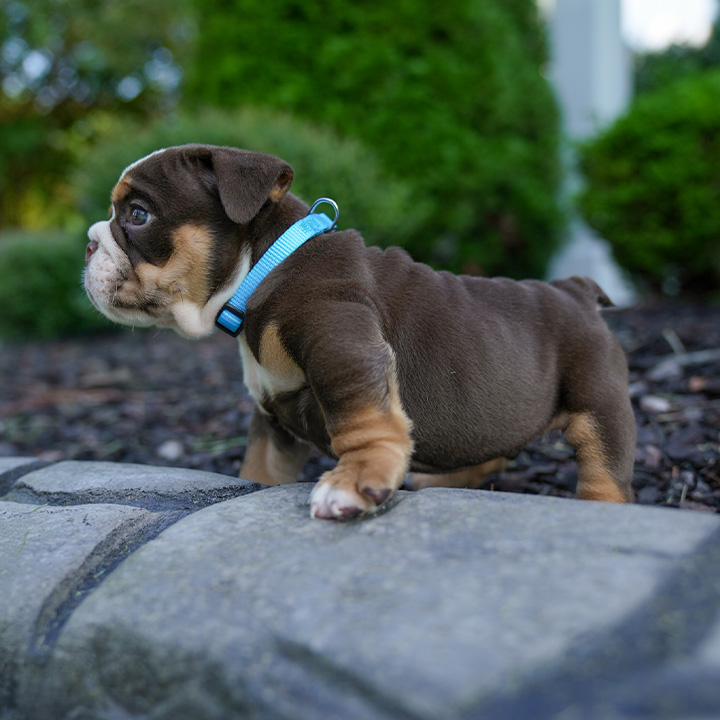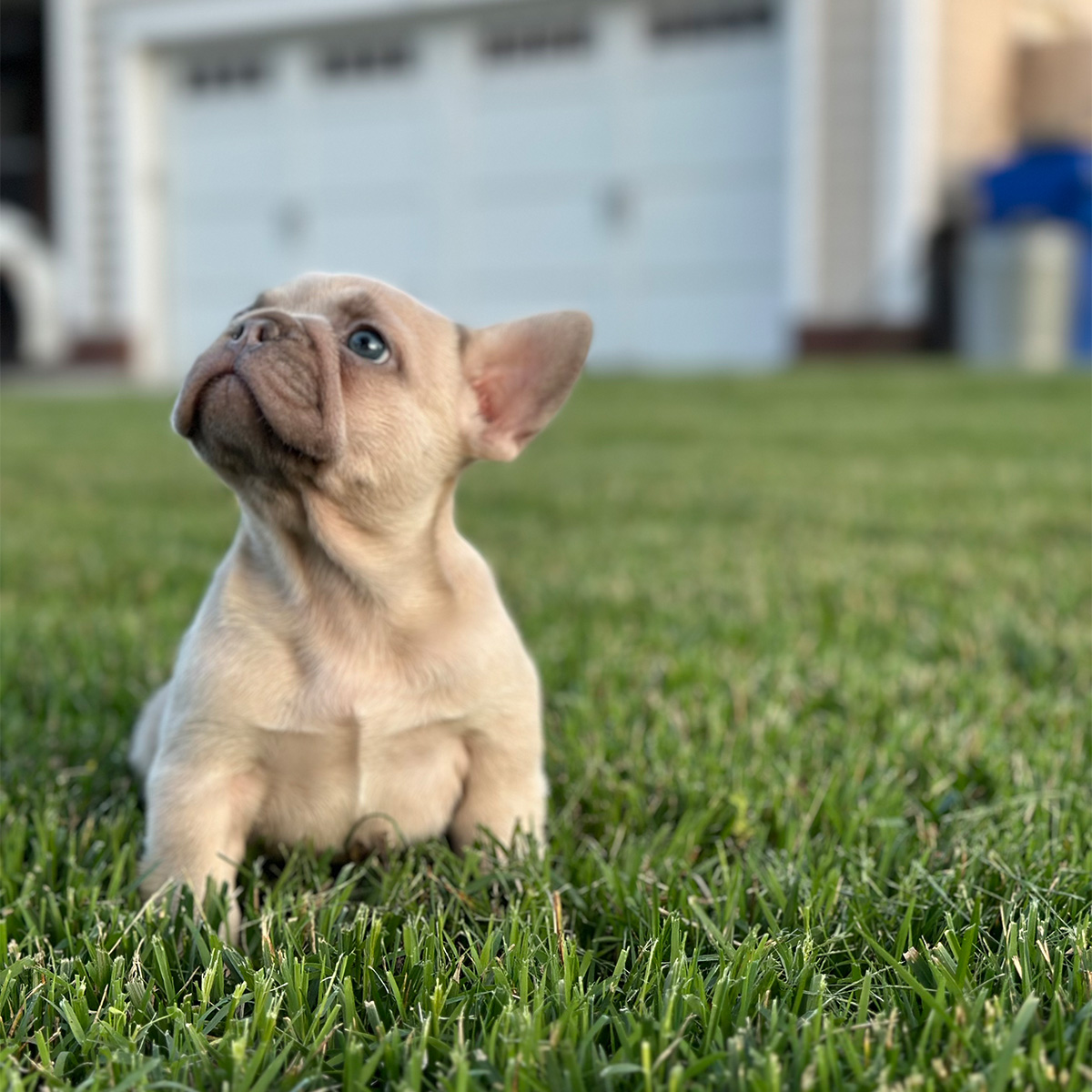Owning an English Bulldog isn’t about picking a cute, wrinkly puppy. It’s about choosing a breed with quirks, health needs, and a personality that demands both patience and love. If you’re not ready for the commitment, don’t buy one. If you are—here’s everything you need to know.
English Bulldog Characteristics
They’re short. Stocky. Heavy.
Most adults weigh between 40–50 pounds, but they carry that weight like tanks. Their signature wrinkles, flat faces, and muscular frames make them instantly recognizable. But those looks come with health baggage.
- Lifespan: 8–10 years
- Coat: Short and fine
- Grooming needs: Moderate (weekly brushing)
- Exercise needs: Low
- Health risks: Brachycephalic syndrome, hip dysplasia, skin infections, cherry eye
Their build makes them poor swimmers and bad runners. But they were bred to be fighters once. What’s left today is their toughness without the violence.
Source: AKC Breed Info – English Bulldog
English Bulldog Personality Traits
They’re not fast. But they’re steady.
Not loud. But stubborn.
They’re loving, protective, and often hilarious without meaning to be.
English Bulldogs don’t crave attention from strangers, but they bond hard with their family. Their loyalty runs deep. They’re not prone to anxiety, but they don’t like to be left out either.
They enjoy lounging and short bursts of play. They’re not good at fetch, but they’ll try—for you.
Common English Bulldog Behavior Problems
Stubbornness. It’s not a myth. They’ll plant their feet and stare at you like you’re the one who doesn’t get it.
Food aggression. Some Bulldogs get possessive over meals or treats. Early training helps.
Chewing. If bored, they’ll chew furniture, shoes, and maybe your drywall.
Overprotectiveness. If not socialized, they’ll get defensive—even with house guests.
Flatulence. Bulldogs are gassy. Their digestive system, short snouts, and eating style make this unavoidable.
What to Expect From an English Bulldog Puppy
They’re not cheap.
A well-bred English Bulldog puppy can cost between $2,000–$5,000. Anything lower? Watch out for poor breeding practices or health shortcuts.
Puppies need frequent vet visits, vaccinations, and parasite treatments. They grow quickly and hit about 80% of their adult size in the first year.
- Feeding: 3x a day at first
- Potty training: Slow, needs patience
- Behavior: Sleepy but mischievous
- Watch for: Breathing issues, skin infections, cherry eye
Early training should focus on consistency, short sessions, and positive reinforcement. Yelling won’t help. They don’t respond to force. They respond to snacks.
Finding the Right English Bulldog Breeder
There are breeders. And then there are responsible breeders.
A responsible English Bulldog breeder:
- Tests for genetic health issues
- Doesn’t breed dogs with known respiratory problems
- Doesn’t overbreed their females
- Keeps clean facilities
- Socializes puppies early
- Answers your questions without dodging
Ask for health clearances. Ask to meet the parents. If the breeder refuses or rushes you, walk away.
You don’t want a cheap Bulldog. You want a healthy one. The cost difference upfront can save you thousands in vet bills.
Source: Humane Society – How to find a responsible breeder
FAQs
Are English Bulldogs aggressive?
Not usually. They were bred for bull-baiting long ago, but today’s Bulldogs are calm and gentle. Aggression typically comes from poor training, lack of socialization, or irresponsible breeding. They may guard food or react defensively, but they aren’t naturally hostile.
Are English Bulldogs smart?
They’re emotionally aware but not task-driven. Bulldogs won’t fetch your slippers or ace obedience trials. But they read their people well and respond to tone, body language, and consistency. They’re not “dumb,” just independent.
Are English Bulldogs stubborn?
Yes—and proud of it. You can’t force them to do anything they don’t want to. But they respond to routine and rewards. Keep training short, firm, and positive. If it’s fun, they’ll join in. If it’s a power struggle, they’ll dig in their heels.
Are English Bulldogs good with cats?
In most cases, yes. When raised with cats, they usually get along fine. They’re not fast or prey-driven, so they don’t chase. However, adult Bulldogs introduced to cats for the first time should be monitored—especially if either animal shows territorial behavior.
Are English Bulldogs good for first-time owners?
Only if you’re ready for high maintenance. They’re not hard in temperament, but their health needs, grooming, and training quirks require serious effort. If you’re looking for an easy starter dog, this isn’t it. But if you’re ready to learn, they’re worth it.
Are English Bulldogs hard to take care of?
Yes. Their wrinkles need cleaning. They overheat fast. They can’t swim. Vet visits are frequent. You need to be okay with drool, snoring, and a dog who may need surgery just to breathe right. They’re sweet—but come with baggage.
What is the downside to Bulldogs?
It’s health, hands down. Breathing problems, skin infections, joint issues, and short lifespan. Vet bills can add up. And they don’t do well in heat or cold. If you want low-maintenance, look elsewhere. If you want devotion, stay the course.
Can English Bulldogs be left alone?
Yes, but not all day. They can manage a few hours if trained to tolerate it, but they’re people-oriented and prone to boredom. Without mental stimulation, they’ll get destructive. Chew toys help. So does a mid-day check-in or walker.
Do English Bulldogs like to be held?
Many do. They love contact and will lean into hugs, lay on your feet, or plop beside you like weighted blankets. But they don’t all enjoy being picked up—especially older ones with joint pain. Let them come to you.
Should I get a male or female Bulldog?
Females tend to mature faster and can be easier to train. Males may be goofier and more headstrong. Both are loyal, but males can be more dominant if not neutered. Choose based on temperament, not just sex. A good breeder will help match you.
Are English Bulldogs hard to housebreak?
Yes, especially compared to other breeds. They don’t like cold or rain, which makes outdoor potty training harder. Crate training helps. So does routine and praise. Don’t expect fast results. This is a slow game.
Do English Bulldogs shed a lot?
They shed more than you’d expect for a short-haired dog. You’ll notice fur on clothes, furniture, and floors—especially during seasonal changes. Regular brushing reduces it, but it won’t stop it. Get a lint roller.
How often should a Bulldog be bathed?
Once every 2–4 weeks, or when they get smelly or itchy. Use a vet-approved shampoo made for sensitive skin. Dry them well—especially in their skin folds—or you risk infections. In between baths, wipe wrinkles and clean ears.
Do English Bulldogs smell?
They can. Wrinkles trap moisture and bacteria. Ears can get funky. Gas is frequent due to digestive issues. A clean Bulldog doesn’t stink—but you have to stay on top of hygiene. Diet plays a role too. Cheap food = bad odors.
Are English Bulldogs easy to train?
Not in the traditional sense. They’re not eager to please. They need short, positive sessions with high-value treats. Avoid punishment—it doesn’t work. With patience and persistence, they’ll learn. But they’ll do it their way, on their timeline.
Final Thoughts
English Bulldogs are not plug-and-play dogs.
They come with health risks, behavior quirks, and high costs.
But if you commit—really commit—you’ll get a companion who’s loyal beyond measure.
They don’t run marathons or guard your house.
They snore next to you.
Follow you from room to room.
And love you without asking for much—except presence, patience, and a cool room to nap in.
At BullRite, we breed Bulldogs the right way.
No shortcuts. No surprises.
Just healthy, well-raised Bulldogs ready for homes that understand what these dogs are—and what they’re not.
→ Ready for the real Bulldog experience? Contact Us Today! or check out our available English bulldog puppies


